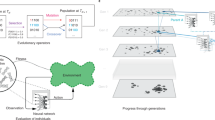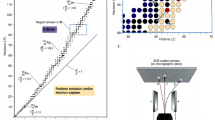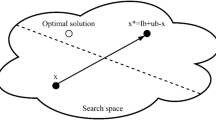Abstract
Benchmarking is a cornerstone in the analysis and development of computational methods, especially in the field of evolutionary computation, where theoretical analysis of the algorithms is almost impossible. In this Article, we show that some of the frequently used benchmark functions have their respective optima in the centre of the feasible set and that this poses a critical problem for the analysis of evolutionary computation methods. We carry out an analysis of seven recently published methods and find that these contain a centre-bias operator that lets them find optima in the centre of the benchmark set with ease. However, this mechanism makes their comparison with other methods (that do not have a centre-bias) meaningless. We compare the computational performance of these seven new methods to two long-standing ones in evolutionary computation (‘differential evolution’ and ‘particle swarm optimization’) on shifted problems and on more advanced benchmark problems. Only one of the seven methods performed consistently better than the pair of old methods, three performed on par, two performed very badly and the worst one performed barely better than a random search. We provide several suggestions that could help to improve analysis and benchmarking in evolutionary computation.
This is a preview of subscription content, access via your institution
Access options
Access Nature and 54 other Nature Portfolio journals
Get Nature+, our best-value online-access subscription
$29.99 / 30 days
cancel any time
Subscribe to this journal
Receive 12 digital issues and online access to articles
$119.00 per year
only $9.92 per issue
Buy this article
- Purchase on Springer Link
- Instant access to full article PDF
Prices may be subject to local taxes which are calculated during checkout

Similar content being viewed by others
Data availability
Data used for the benchmark functions will be made available at https://doi.org/10.24433/CO.1268126.v1 (ref. 30).
Code availability
The code that supports the findings of this study will be made available at https://doi.org/10.24433/CO.1268126.v1 (ref. 30).
References
Campelo, F. & Aranha, C. Evolutionary computation bestiary. https://github.com/fcampelo/EC-Bestiary (accessed 7 February 2022).
Weyland, D. A rigorous analysis of the harmony search algorithm: how the research community can be misled by a novel methodology. Int. J. Appl. Metaheuristic Comput. 12, 50–60 (2010).
Camacho Villalón, C. L., Dorigo, M. & Stützle, T. The intelligent water drops algorithm: why it cannot be considered a novel algorithm. Swarm Intell. 13, 173–192 (2019).
Camacho Villalón, C. L., Stützle, T. & Dorigo, M. Grey wolf, firefly and bat algorithms: three widespread algorithms that do not contain any novelty. In Int. Conference on Swarm Intelligence 121–133 (Springer, 2020).
Camacho Villalón, C. L., Stützle, T. & Dorigo, M. Cuckoo Search ≡ μ+λ – Evolution Strategy — A Rigorous Analysis of an Algorithm that has Been Misleading the Research Community for More Than 10 Years and Nobody Seems to have Noticed TR/IRIDIA/2021-006 (IRIDIA, Université Libre de Bruxelles, 2021).
Piotrowski, A. P., Napiorkowski, J. J. & Rowinski, P. M. How novel is the “novel” black hole optimization approach? Inf. Sci. 267, 191–200 (2014).
Aranha, C. et al. Metaphor‑based metaheuristics, a call for action: the elephant in the room. Swarm Intell. 16, 1–6 (2022).
Hellwig, M. & Beyer, H. G. Benchmarking evolutionary algorithms for single objective real-valued constrained optimization – a critical review. Swarm Evol. Comput. 44, 927–944 (2019).
Garcia-Martinez, C., Gutierrez, P. D., Molina, D., Lozano, M. & Herrera, F. Since CEC 2005 competition on real-parameter optimisation: a decade of research, progress and comparative analysis’s weakness. Soft Comput. 21, 5573–5583 (2017).
Hansen, N., Auger, A., Mersmann, O., Tuvar, T. & Brockhoff, D. COCO: a platform for comparing continuous optimizers in a black-box setting. Preprint at https://arxiv.org/abs/1603.08785 (2016).
Suganthan, N. P. Github repository of CEC competitions. GitHub https://github.com/P-N-Suganthan (2022).
Garden, R. W. & Engelbrecht, A. P. Analysis and classification of optimization benchmark functions and benchmark suites. In IEEE Congress on Evolutionary Computation 1664–1669 (2014).
COCO Data Archives (2022); https://numbbo.github.io/data-archive/
Piotrowski, A. P. Regarding the rankings of optimization heuristics based on artificially-constructed benchmark functions. Inf. Sci. 297, 191–201 (2015).
Tzanetos, A. & Dounias, G. Nature inspired optimization algorithms or simply variations of metaheuristics? Artif. Intell. Rev. 54, 1841–1862 (2021).
Kumar, A., Suganthan, P. N., Mohamed, A. W., Hadi, A. A. & Mohamed, A. K. Special session & competitions on single objective bound constrained numerical optimization. In IEEE Congress on Evolutionary Computation (IEEE, 2021).
Niu, P., Niu, S., Liu, N. & Chang, L. The defect of the Grey Wolf optimization algorithm and its verification method. Knowl.-Based Syst. 171, 37–43 (2019).
Castelli, M., Manzoni, L., Mariot, L., Nobile, M. S. & Tangherloni, A. Salp Swarm Optimization: a critical review. Expert Syst. Appl. 189, 116029 (2022).
Kudela, J. Commentary on: “STOA: A bio-inspired based optimization algorithm for industrial engineering problems” [EAAI, 82 (2019), 148–174] and “Tunicate Swarm Algorithm: A new bio-inspired based metaheuristic paradigm for global optimization” [EAAI, 90 (2020), no. 103541]. Eng. Appl. Artif. Intell. 113, 104930 (2022).
Suyanto, S., Ariyanto, A. A. & Ariyanto, A. F. Komodo Mlipir Algorithm. Appl. Soft Comput. 114, 108043 (2022).
Li, S., Chen, H., Wang, M., Heidari, A. A. & Mirjalili, S. Slime mould algorithm: a new method for stochastic optimization. Future Gener. Comput. Syst. 111, 300–323 (2020).
Arora, S. & Singh, S. Butterfly optimization algorithm: a novel approach for global optimization. Soft Comput. 23, 715–734 (2019).
Ahmadianfar, I., Bozorg-Haddad, O. & Chu, X. Gradient-based optimizer: a new metaheuristic optimization algorithm. Inf. Sci. 540, 131–159 (2020).
Oszust, M. Enhanced marine predators algorithm with local escaping operator for global optimization. Knowl.-Based Syst. 232, 107467 (2021).
Heidari, A. A. et al. Harris hawks optimization: algorithm and applications. Future Gener. Comput. Syst. 97, 849–872 (2019).
Dhiman, G. & Kaur, A. STOA: a bio-inspired based optimization algorithm for industrial engineering problems. Eng. Appl. Artif. Intell. 82, 148–174 (2019).
Tanabe, R. & Fukunaga, A. Improving the search performance of SHADE using linear population size reduction. In 2014 IEEE Congress on Evolutionary Computation 1658–1665 (IEEE, 2014).
Zhang, G. & Shi, Y. Hybrid sampling evolution strategy for solving single objective bound constrained problems. In 2018 IEEE Congress on Evolutionary Computation (IEEE, 2018).
Fister, I. et al. On selection of a benchmark by determining the algorithms’ qualities. IEEE Access 9, 51166–51178 (2021).
CodeOcean Capsule (2022); https://doi.org/10.24433/CO.1268126.v1
Bayzidi, H., Talatahari, S., Saraee, M. & Lamarche, C.-P. Social network search for solving engineering optimization problems. Comput. Intell. Neurosc. 9, 8548639 (2021).
Kudela, J. & Matousek, R. New benchmark functions for single-objective optimization based on a zigzag pattern. IEEE Access 10, 8262–8278 (2022).
Vecek, N., Crepinsek, M., Mernik, M. & Hrncic, D. A comparison between different chess rating systems for ranking evolutionary algorithms. In 2014 Federated Conference on Computer Science and Information Systems 511–518 (IEEE, 2014).
Del Ser, J. et al. More is not always better: insights from a massive comparison of meta-heuristic algorithms over real-parameter optimization problems. In IEEE Symposium Series on Computational Intelligence (IEEE, 2021).
Scipy benchmark functions. GitHub https://github.com/scipy/scipy/tree/main/benchmarks/benchmarks/go_benchmark_functions (2022).
Tzanetos, A. & Dounias, G. A comprehensive survey on the applications of swarm intelligence and bio-inspired evolutionary strategies. Mach. Learn. Paradigms 18, 337–378 (2020).
Gleixner, A. et al. MIPLIB 2017: data-driven compilation of the 6th mixed-integer programming library. Math. Program. Comput. 13, 443–490 (2021).
Mohamed, A.W. et al. Problem Definitions and Evaluation Criteria for the CEC 2021 Special Session and Competition on Single Objective Bound Constrained Numerical Optimization (Cairo University, 2020).
Yue, C.T. et al. Problem Definitions and Evaluation Criteria for the CEC 2020 Special Session and Competition on Single Objective Bound Constrained Numerical Optimization Technical report 201911 (Computational Intelligence Laboratory, Zhengzhou University, 2019).
Kudela, J. Novel zigzag-based benchmark functions for bound constrained single objective optimization. In 2021 IEEE Congress on Evolutionary Computation (IEEE, 2021).
Vecek, N., Crepinsek, M. & Mernik, M. On the influence of the number of algorithms, problems, and independent runs in the comparison of evolutionary algorithms. Appl. Soft Comput. 54, 23–45 (2017).
Osaba, E. et al. A tutorial on the design, experimentation and application of metaheuristic algorithms to real-world optimization problems. Swarm Evol. Comput. 64, 100888 (2021).
Doerr, C., Wang, H., Ye, F., van Rijn, S. & Back, T. IOHprofiler: a benchmarking and profiling tool for iterative optimization heuristics. Preprint at https://arxiv.org/abs/1810.05281 (2018).
Acknowledgements
This work was supported by the Grant Agency of the Czech Republic project 22-31173S and by the Brno University of Technology project FSI-S-20-6538.
Author information
Authors and Affiliations
Contributions
J.K. performed the conceptualization, design, data analysis and interpretation, drafting of the manuscript and critical revision of the manuscript for important intellectual content.
Corresponding author
Ethics declarations
Competing interests
The author declares no competing interests.
Peer review
Peer review information
Nature Machine Intelligence thanks Alexandros Tzanetos and the other, anonymous, reviewer(s) for their contribution to the peer review of this work.
Additional information
Publisher’s note Springer Nature remains neutral with regard to jurisdictional claims in published maps and institutional affiliations.
Supplementary information
Supplementary Information
Supplementary discussion and Tables 1–4.
Rights and permissions
Springer Nature or its licensor (e.g. a society or other partner) holds exclusive rights to this article under a publishing agreement with the author(s) or other rightsholder(s); author self-archiving of the accepted manuscript version of this article is solely governed by the terms of such publishing agreement and applicable law.
About this article
Cite this article
Kudela, J. A critical problem in benchmarking and analysis of evolutionary computation methods. Nat Mach Intell 4, 1238–1245 (2022). https://doi.org/10.1038/s42256-022-00579-0
Received:
Accepted:
Published:
Issue Date:
DOI: https://doi.org/10.1038/s42256-022-00579-0
This article is cited by
-
A Literature Review and Critical Analysis of Metaheuristics Recently Developed
Archives of Computational Methods in Engineering (2024)



